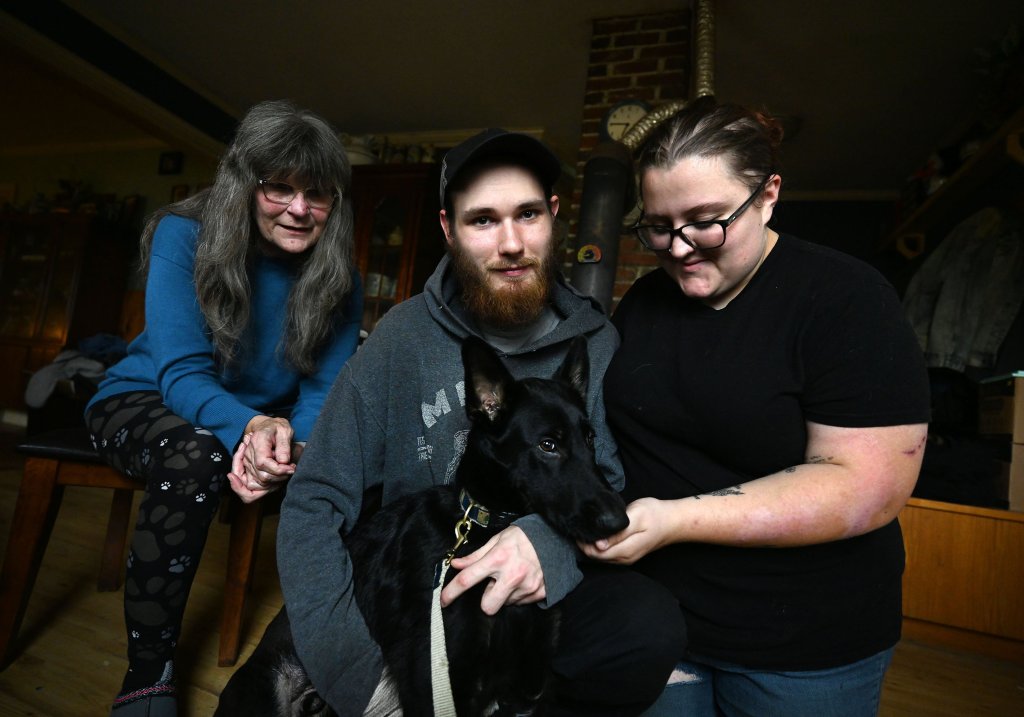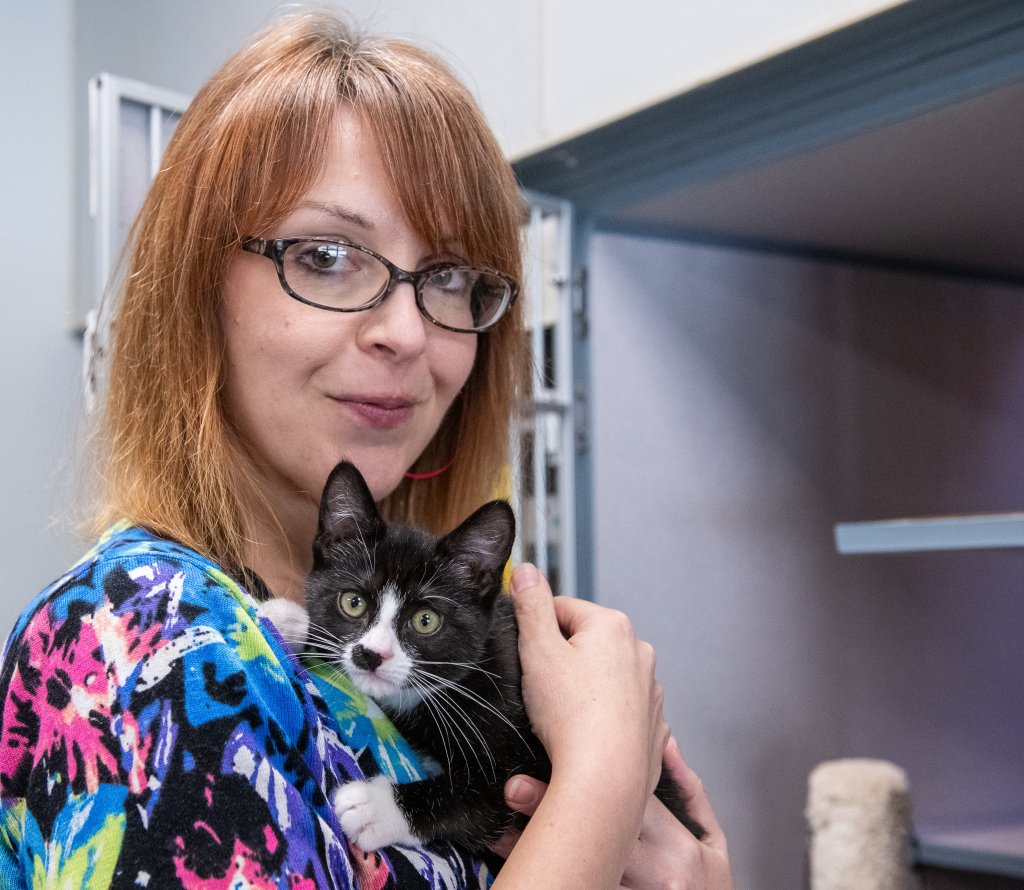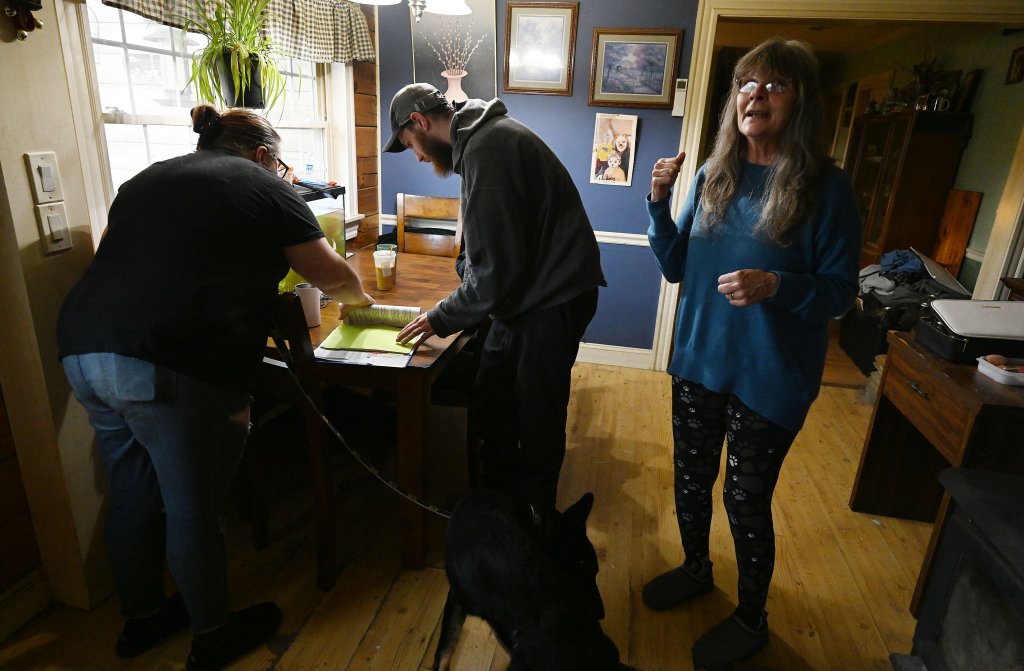
Joyce Mathews adopted a German shepherd from a breeder in Peru this summer to act as a guide dog for her son, John, who is going blind.
They brought the puppy, who they named Cheyenne, back to their home to Monroe. Two weeks later, however, on the day he was scheduled to get vaccinated, Cheyenne began acting lethargic and having diarrhea.
He had parvovirus, a highly contagious, often deadly virus. Mathews said the treatment, which would give Cheyenne only a slim chance of survival, was going to cost $10,000 she didn’t have.
Parvovirus outbreaks in several counties in Maine have devastated pet owners over the last few months, with dog parks shuttering and local police departments and Maine officials warning residents to vaccinate their pets.
Some Maine veterinarians say unvaccinated pets are a significant problem in the state. While pet vaccination rates remain high across the country, cost, access and even vaccine skepticism are stopping enough owners from getting shots for their pets that it is a health risk for everybody else’s.
‘AREN’T EVEN TAKING THEM TO A VET’
Parvovirus outbreaks were reported in Aroostook County and the Bangor area in September, closing dog parks in Caribou and Fort Fairfield. Cases also have been reported in Oxford County.
The virus spreads through feces or direct contact with an infected dog. Symptoms include lethargy, loss of appetite and vomiting, as well as severe, often bloody, diarrhea, abdominal pain and bloating, and fever or low body temperature.
Experts say the parvovirus outbreaks, along with identification of rabies in a number of wild animals throughout Maine this fall, are a good reminder of the dangers of not vaccinating your pet, and what can happen when too many owners don’t get their cat or dog the recommended shots.
Parvovirus is not new to Maine, but an outbreak during this time of year is unusual, said Kathryn Ravenscraft, director of development and communications at the Bangor Humane Society, who said cases usually appear in the spring.
She said the rising costs of veterinary care may be leading to fewer vaccinated pets.
“It costs more to buy syringes, it costs more to do the vaccinations themselves,” Ravenscraft said. “So obviously, some of that cost is going to be passed on to pet owners, and for anyone who is struggling just to feed their animal, those increases are trouble.”
In central Maine, providers say unvaccinated pets are becoming more common. Officials at Atlas Veterinary Urgent Care in Augusta said they see at least one every day, and Katie Lisnik, executive director of the Greater Androscoggin Humane Society in Auburn, said she sees pet owners who don’t vaccinate their pets because they believe the diseases are no longer around.

A statewide shortage of veterinarians also poses a barrier for pet owners, made worse by a pandemic-era slowdown in appointments that caused bottlenecks at practices.
Experts also point to pet vaccine hesitancy — skepticism over the safety and efficacy of giving routine vaccinations to animals — as a reason why pets are not being vaccinated.
Increasingly, researchers say, misinformation on human vaccines is carrying over to their canine counterparts.
According to a 2023 study from Boston University, nearly 40% of dog owners believe that canine vaccines are unsafe, more than 20% believe these vaccines are ineffective, and 30% consider them to be medically unnecessary.
About 37% of dog owners also believe that canine vaccination could cause their dogs to develop autism, even though there is no scientific data that validates this risk for animals or humans.
“People are extrapolating the concerns on the human side,” said David Cloutier, Maine Veterinary Medical Association Board president. “There’s so much misinformation.”
As cases of canine parvovirus increase, Maine animal health experts say that pet owners may need more education on the safety and effectiveness of vaccinating pets.
In these cases, Cloutier said, veterinarians should reassure owners that the benefits of pet vaccination far outweigh the risks of leaving a cat or dog unprotected.
One patient, he said, wanted to make sure the vaccine didn’t contain thermisol, a chemical used in some vaccines that has been falsely linked to autism.
“If that’s what made that client comfortable, by all means we’ll show them packaging,” he said.
Kate Domenico, a veterinarian at Portland Veterinarian Emergency and Specialty Care, said she doesn’t hear much anti-vaccine sentiment in Maine.
However, she said, her clients occasionally get bad medical advice from breeders who claim vaccinating for anything outside of the core vaccines “makes the dog sick.”
“They give out bad information,” Domenico said. “I don’t know what they’re basing that on — that one of their puppies maybe had a vaccine reaction 20 years ago, and therefore they shouldn’t vaccinate anybody.”
She said most Mainers who don’t vaccinate their pets likely have never sought veterinary care.
“The people that I see that are not vaccinating their pets aren’t even taking them to a veterinarian,” Domenico said. “It’s not even an anti-vaxxer thing. They’re just like: ‘Oh, I can’t find a vet.'”
“I don’t think they’ve made a huge effort,” she added. “And it’s costly to go to the vet.”
Whatever the reason, experts stress that failing to vaccinate your pets raises the danger for them and for any other animals they come in contact with.
“If you’re not getting your animal vaccinated and you’re taking it into the community, then you’re spreading that risk, so people really need to think about it,” Lisnik said.
‘REALLY TRAUMATIC’
Treating parvovirus can cost anywhere from $100 to $10,000, Domenico said. Animals often have to be hospitalized for extended periods of time to combat the symptoms of the disease, including dehydration and septic shock, which causes costs to add up.
The distemper combination vaccine, a highly effective three-dose vaccine that protects against parvovirus, distemper and other viral infections, costs between $20 and $100 and gives dogs at least three years of immunity.
Tammy Gregor was biking home to Monmouth in September when she was bitten by an unvaccinated dog on Leeds Junction Road in Wales. It was a small bite, barely drawing blood from her calf, but her friends and doctor recommended she go on antibiotics.
She says she’s lucky the dog didn’t have anything serious.
“I’m fortunate,” Gregor, 55, said. “But it brings a new light to the situation, because I’m outside all the time, either walking, biking, hiking. And it brings the awareness that that can be very dangerous.”
Humans can get rabies through a bite or scratch from an infected animal. Canine parvovirus cannot be transmitted between humans and dogs, but parvovirus can survive in the ground and soil from infected animal feces for years.

When Cheyenne started showing symptoms of parvovirus, Mathews said she had no choice but to pull together the money to pay for his antibody treatment and hospital stays while she worked during the day. He came home at night and her son stayed up with him, injecting fluid, administering pain and nausea medicine, and giving him probiotics.
After Cheyenne finished treatment, Mathews said she bleached the floor of her log cabin in Monroe and bought supplies to treat the soil. She wants to be sure that the virus won’t infect her other dogs, even though they’re vaccinated.
“It was really traumatic,” Mathews said. “It was a lot of long nights. A lot of crying, a lot of praying. I could’ve spent that money on something else, but to save a life is the best feeling in the world.”
Cheyenne survived, and Mathews hasn’t stopped advocating for pet vaccinations.
She hopes others will do the same.
“I believe every pet should be vaccinated,” Mathews said. “If you want them to live a long life, the best thing you can do is keep up on your vaccines.”

We invite you to add your comments. We encourage a thoughtful exchange of ideas and information on this website. By joining the conversation, you are agreeing to our commenting policy and terms of use. More information is found on our FAQs. You can modify your screen name here.
Comments are managed by our staff during regular business hours Monday through Friday as well as limited hours on Saturday and Sunday. Comments held for moderation outside of those hours may take longer to approve.
Join the Conversation
Please sign into your CentralMaine.com account to participate in conversations below. If you do not have an account, you can register or subscribe. Questions? Please see our FAQs.